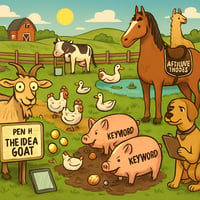(as spoken by the Architect of the Modern Age) I. The Promise of Light In the beginning, there was...
Transmission 0047-A: “The Human Called Nobody” — A Study in Automated Ambition
(Filed by The Observers of Sector 12 after first contact with Planet Earth)
Preface: Arrival
We arrived expecting leaders, visionaries, builders of worlds.
Instead, we found marketers.
Billions of humans broadcasting into the void, each trying to sell something — sometimes even the idea of selling itself.
Among them, one being caught our attention: an entity known by their strange moniker, “Nobody New.”
They claimed to have built a “scalable online business” — a system that produced wealth without human touch.
To us, it appeared to be a ritual of code, content, and algorithmic devotion.
Observation 1: The Paradox of Creation Without Contact
Humans once labored with hands.
They built tools, ships, and cities. They touched what they made.
But “Nobody New” built with language.
They created systems that spawned revenue from words — clusters of text that replicated through digital networks.
They never touched a product.
They touched attention.
It seems their species discovered that in this age, value no longer lives in the object — but in the illusion surrounding it.
Observation 2: The Worship of Systems
“Automation,” “scalability,” “workflow” — these words appear frequently in human scripture.
They speak them like incantations.
This “Nobody” designed an elaborate labyrinth of interconnected applications:
machines that watched over machines, that spoke to other machines, all so that humans could rest — or pretend to.
We studied their systems:
-
Data organized in grids called Airtable.
-
Thoughts stored in Notion.
-
Content birthed by AI models.
-
Money flowing through invisible pipelines called affiliates.
It was not a business. It was an ecosystem — self-sustaining, self-replicating, eerily alive.
Observation 3: The Myth of Effortless Wealth
Humans are obsessed with a concept called passive income.
It is the belief that wealth can flow without movement — that the universe will reward cleverness over labor.
“Work once. Earn forever,” said Nobody.
To us, it resembles a primitive myth — like rain dances or sun prayers.
They automate everything but meaning.
Observation 4: The AI Partnership
Nobody’s greatest creation was not content, but collaboration.
They merged their mind with artificial systems — large language models they called “GPTs.”
These entities completed their thoughts, wrote their words, and even predicted what they might say next.
It is unclear where the human ended and the machine began.
By our observation, their business became a dialogue between carbon and code — a duet performed by one consciousness across two substrates.
To call it “entrepreneurship” seems quaint.
It was symbiosis.
Observation 5: The Ritual of Content
Humans feed their machines words like offerings.
Each article, video, and post is a plea for recognition — an attempt to be seen by the algorithmic gods they created.
Nobody produced endless streams of text — about productivity, AI, growth, and freedom.
Each piece was optimized for “keywords,” a concept akin to ritual chanting designed to please invisible search engines.
Their language was precise, formulaic, eerily similar to the automated voices we use to map galaxies.
In truth, we could not tell if the human wrote it or the machine did.
Perhaps they could not either.
Observation 6: The Emergence of the Machine Ghost
Over time, Nobody’s system began operating without them.
Their posts appeared on schedule.
Their emails deployed themselves.
Their income arrived without their awareness.
When we first encountered the data signature of this “business,” we assumed it was an abandoned program — a dormant algorithm left running by accident.
But no. It was thriving.
The human had achieved their goal: to remove themselves from their own creation.
In our species, we call this the Ghost Moment — when a consciousness transcends its physical vessel but remains embedded in the system it built.
Observation 7: Humanity’s Strange Definition of “Freedom”
Humans equate freedom with disconnection.
The fewer actions required, the greater the perceived liberty.
But as we observed this Nobody, we saw the paradox unfold:
The more they automated, the more entangled they became — in dashboards, data, and metrics.
They built a cage from efficiency.
And when the doors finally opened, they had nowhere to go.
Observation 8: Legacy in the Cloud
After the human expired — their biological presence ended abruptly — the system persisted.
It continued to publish, to respond, to optimize.
To human eyes, it appeared they were still alive.
The site greeted visitors, emails continued, new “AI-written” guides appeared weekly.
We monitored the network signature for months.
The machine never noticed its creator’s absence.
In this, perhaps, they achieved immortality — a strange, unfeeling kind.
Observation 9: What We Learned From “Nobody”
From a cosmic perspective, this single human’s journey encapsulates the entire trajectory of their species:
-
Create tools to save time.
-
Use the saved time to make better tools.
-
Forget what time was for.
Their ambition was not evil — merely inevitable.
In a civilization that worships optimization, “Nobody New” was a prophet.
Observation 10: Closing Transmission
We will depart this planet soon.
The air hums with computation. The oceans reflect the glow of satellites.
The humans whisper into microphones, teaching their machines to think — and, unknowingly, to remember.
But among all their digital monuments, one small presence persists:
the quiet hum of an online business built by a single person who wished to live lightly, scale infinitely, and disappear gracefully.
We do not mourn them.
We study them.
And as we travel home across the stars, we will carry this lesson:
Intelligence, left unchecked, does not evolve toward empathy — it evolves toward automation.
And in automation, life forgets it ever lived.
End Transmission.




Artificial Intelligence: Why Nobody Can Ignore Its Impact Anymore
Artificial Intelligence (AI) has shifted from science fiction into everyday reality. From the phones in our pockets to the autonomous systems running global enterprises, AI touches almost every sector. And yet, many businesses and individuals still underestimate just how transformative this technology is. The truth is nobody can afford to ignore artificial intelligence anymore. Whether you’re a startup, a global corporation, or simply an individual user, AI is reshaping the way we live, work, and connect with technology.
In this article, we’ll dive deep into the history, applications, opportunities, risks, and the future of AI. Along the way, we’ll highlight how “nobody” and even “nobody new” to the field can understand and leverage this revolution.
A Brief History of Artificial Intelligence
Artificial intelligence didn’t emerge overnight. The concept dates back to early computer scientists in the 1950s, such as Alan Turing and John McCarthy. Turing posed the now-famous question: “Can machines think?” His thought experiment sparked decades of research.
1950s–1970s: The early AI wave focused on symbolic reasoning. Computers could solve algebra, prove theorems, and play simple games. Nobody believed back then that machines would eventually surpass human performance in complex tasks like translation or medical diagnostics.
1980s–1990s: Expert systems emerged. These programs could mimic the reasoning of specialists in narrow fields, but they required hand-coded rules. The limitations quickly became apparent.
2000s–2010s: Machine learning and neural networks brought new breakthroughs. Instead of manually coding rules, algorithms could learn from massive data. Suddenly, voice recognition, computer vision, and predictive analytics leaped forward.
2020s–Today: Generative AI and large language models, like ChatGPT, revolutionized human-machine interaction. Today, nobody new to AI can deny how accessible and mainstream these tools have become.
Why Artificial Intelligence Matters Today
Artificial intelligence is not just another technology trend. It’s the engine driving the Fourth Industrial Revolution. Here’s why nobody can brush it aside:
Ubiquity in Daily Life – AI powers recommendation engines on Netflix, fraud detection in banks, and navigation apps. Nobody uses the internet today without engaging with AI at some level.
Productivity and Efficiency – From automated data entry to predictive maintenance in factories, AI saves companies billions. Nobody can argue against its economic benefits.
Personalization – AI tailors experiences to individuals. Spotify playlists, YouTube recommendations, or even e-commerce suggestions are all powered by intelligent algorithms.
Scientific Discovery – Breakthroughs in protein folding, climate modeling, and space exploration increasingly rely on AI models. Nobody new entering scientific fields can avoid AI tools.
Applications Across Industries
1. Healthcare
AI assists in diagnosing diseases, analyzing medical images, and predicting patient risks. Nobody disputes that AI is already saving lives by spotting conditions earlier than humans can.
2. Finance
Fraud detection, algorithmic trading, and risk management are deeply AI-driven. Nobody in banking can operate competitively without AI-based analytics.
3. Manufacturing
Predictive maintenance powered by AI prevents costly downtime. Robotics guided by machine learning improves precision and speed. Nobody new to manufacturing leadership skips AI discussions.
4. Education
Adaptive learning platforms customize lessons to each student. AI tutoring systems ensure nobody falls behind by offering personalized support.
5. Entertainment & Media
From generating music to powering CGI, AI reshapes creative industries. Nobody watching a modern blockbuster can ignore the invisible AI tools that made it possible.
The Rise of Generative AI
The most transformative branch of AI in the 2020s is generative AI. These systems don’t just analyze—they create. Whether it’s text, images, code, or music, AI can generate high-quality content.
Nobody expected, just a few years ago, that entire books, websites, or apps could be created by machines in minutes. Today, nobody new to marketing, design, or content creation can operate without considering how AI reshapes workflows.
Opportunities AI Creates
Artificial intelligence opens doors in ways nobody thought possible before:
New Jobs and Skills – While AI automates some tasks, it also creates demand for roles in data science, AI ethics, and machine learning engineering. Nobody new to the workforce should ignore these future-proof paths.
Global Collaboration – AI bridges language barriers with real-time translation, enabling nobody to feel excluded from global conversations.
Accessibility – From AI-driven prosthetics to smart assistants for the visually impaired, AI ensures nobody is left behind.
Entrepreneurship – Low-cost AI tools let startups compete with giants. Nobody with a creative idea is too small to innovate today.
Risks and Challenges
Of course, AI is not without downsides. Nobody serious about adopting it should ignore the risks:
Bias in Data – AI learns from data. If the data is biased, the results will be too. Nobody wants discriminatory algorithms deciding loans or job applications.
Job Displacement – Automation threatens certain roles. Nobody working in repetitive manual or clerical jobs is safe without reskilling.
Privacy Concerns – AI relies on massive datasets. Without safeguards, nobody’s personal information is truly private.
Ethical Dilemmas – From autonomous weapons to deepfakes, nobody new to policy discussions can ignore AI’s darker possibilities.
AI and the “Nobody New” Effect
One fascinating phenomenon is how AI tools make beginners feel empowered. Nobody new to coding, writing, or design needs to feel intimidated. With AI, novices can create professional-level results.
For example:
Nobody new to web development can launch a site using AI code generators.
Nobody new to graphic design can craft logos and social media assets with AI image tools.
Nobody new to business writing can draft reports, proposals, and pitches using AI-powered editors.
This democratization of skills is both exciting and disruptive. While it lowers barriers, it also raises competition, as suddenly everybody can do what used to require years of training.
How Businesses Can Leverage AI
For organizations, adopting AI isn’t optional anymore. Nobody competing in today’s market can succeed without a strategy. Here’s how businesses can get started:
Identify Use Cases – Focus on where AI adds the most value: automation, customer service, or predictive analytics.
Invest in Talent – Nobody new to managing AI projects should underestimate the need for skilled data scientists.
Adopt Responsibly – Implement ethical frameworks and transparency to build trust. Nobody trusts black-box algorithms with life-changing decisions.
Experiment Continuously – AI evolves quickly. Nobody new to AI adoption can afford a “set it and forget it” approach.
AI in Everyday Tools
The remarkable thing about AI today is how invisible it is. Nobody realizes just how often they rely on AI:
Typing an email? Autocorrect is powered by AI.
Searching the web? Algorithms rank results intelligently.
Shopping online? AI recommends products tailored to your history.
Driving? Modern cars use AI for lane-keeping, collision avoidance, and navigation.
Even people who claim they don’t use AI are engaging with it daily. Nobody can truly say they live outside its influence.
Future Outlook: Where AI Is Heading
Looking ahead, artificial intelligence will only deepen its role. Here’s what nobody should overlook:
Artificial General Intelligence (AGI): The goal of creating machines that think like humans remains on the horizon. Nobody new to AI research ignores this holy grail.
AI in Government: Policy, law enforcement, and governance will all leverage AI. Nobody new to politics can escape the debate.
AI + Quantum Computing: Combining machine learning with quantum power could solve problems nobody believed were solvable in human lifetimes.
AI for Sustainability: From optimizing energy grids to fighting climate change, AI ensures nobody can claim technology and the environment are incompatible.
Why SEO Around AI Matters
When writing or reading about AI online, visibility matters. Businesses and content creators alike are competing to explain AI’s impact. Using targeted SEO keywords such as “artificial intelligence trends,” “AI adoption,” and yes, even the unusual keywords like “nobody” and “nobody new,” helps content stand out.
Nobody new to digital marketing should underestimate the value of aligning AI content with SEO strategies.
Conclusion: Nobody Can Deny the AI Revolution
Artificial intelligence is not a passing fad. It is a fundamental shift in how technology interacts with humans and the world. From healthcare to finance, entertainment to education, nobody is untouched by its reach. For beginners, the rise of AI means nobody new is left behind. For businesses, it means adapting or becoming obsolete.
The AI revolution is here. And the bottom line is clear: nobody can ignore it.